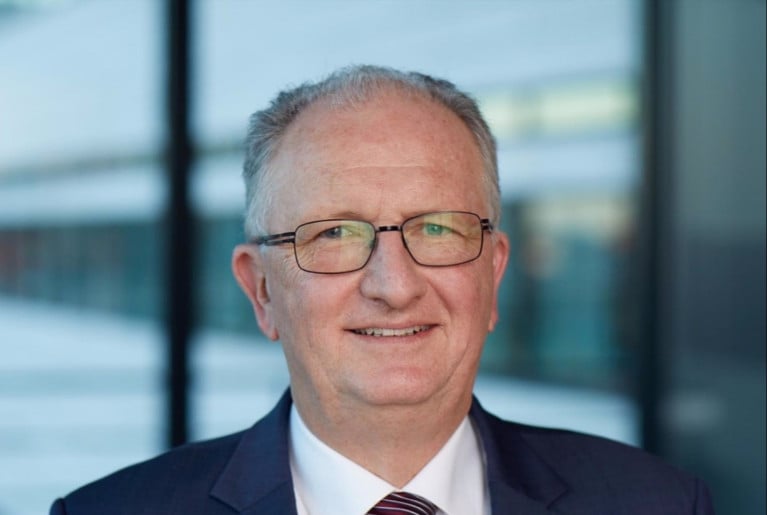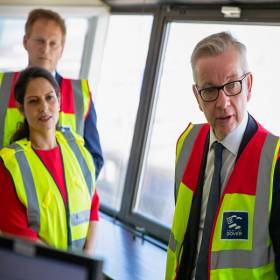Displaying items by tag: New Appointment
New Appointment at Isle of Man Ship Registry (IOMSR) to Further Expand Operations in Northern Europe & Scandinavia
A new appointment at The Isle of Man Ship Registry (IOMSR) to further expand its presence in northern Europe, has taken place with a business development manager to focus on the region and Scandinavia.
Alexander Christensen, who has a wealth of experience in business development roles within the maritime industry in a near 25-year career, has held a series of senior roles. He is a former vice president for Hudson Analytics a consulting company dealing with US regulatory requirements for foreign vessel owners trading in US waters.
He has also been a business director for global maritime regulatory specialists T&T Salvage, before moving to IML Marine. In his new role with IOMSR he will build on the flag state’s existing presence in Northern Europe by meeting clients and prospects.
Toby Brooks, deputy director of IOMSR, said: “We are delighted to have Alexander in this new role with his broad experience of maritime in the region. We see Northern Europe as one of our prime markets where we are already strong but believe with our outlook and approach there is considerable opportunity for growth. We want greater awareness and appreciation of how we as a flag state are evolving in line with the rapid change in the industry.
“We are committed to driving decarbonisation and ship innovation across all forms of propulsion from alternative fuels, to battery power to autonomous vessels to wind and rotor blades.
“We think our team’s passion and hunger can resonate and give us a competitive edge here through Alexander. The Northern European ship owning market is driving so much of the positive change in maritime which fits our outlook. We are on the side of innovators, those who think differently.”
Mr Christensen said: “The Isle of Man Ship Registry is one of the leading, most progressive, flag states in the world. The Registry has not only proved its performance for decades on key indicators like the Paris and Tokyo whitelists it is also leading change in the industry with award winning sustainability and innovation practices.
“This matters in the highly advanced maritime markets like Northern Europe which is looking for flag states who can keep pace with their innovation and share their vision.
“It is exciting to be able to showcase a registry which has a formidable track record of supporting innovation of fuels, for example, being the first flag state to offer a reduction in registration fees for vessels deploying green technology.
“Moreover, the Isle of Man’s technical team are prepared to embrace new ideas to drive decarbonisation, as they did for Oslo-listed shipping company BW LPG enabling its ships to be retrofitted to run on liquefied petroleum gas (LPG). This work set a precedent in the industry enabling the IOMSR to issue the first flag acceptance of a modification to use LPG as fuel for previous code gas tankers.
“This is the kind of eye catching pedigree that Northern European markets are searching for. I really look forward to raising greater awareness of the Isle of Man Ship Registry here.”
In April 2022 IOMSR became the world’s first flag state to reduce registration fees for ships deploying green technology.
The measure gives ship owners a 15 per cent reduction on their annual registration fee. The reduced fee is available to operators of cargo ships, commercial yachts or passenger ships which are investing in biofuel, alternative fuels, wind, or shore-side energy technology.
The IOMSR further became the first flag state to join the ‘Getting to Zero Coalition’ in 2020. It is a partnership between the Global Maritime Forum, the Friends of Ocean Action and the World Economic Forum.
In 2020 the IOMSR formally launched the first ever seafarer welfare app designed by a flag state. ‘Crew Matters’ is the most advanced of its kind ever produced for seafarers. It is available to seafarers worldwide. (Afloat.ie, adds this week, Toby Brooks and Cameron Mitchell, Director of IOMSR, will be attending the International Seafarers’ Welfare and Assistance Network in Helsinki, Finland).
The IOMSR is one of the world’s leading flag states and is ranked 18 in the world by Clarkson’s with around 300 ships and 12.5m GT under its flag. The registry has held top spot on the Paris MoU Port State Control whitelist and is on Tokyo MoU whitelist.
The registry is headquartered in Douglas, Isle of Man, which is a self-governing British Crown dependency and is a Category One member of the Red Ensign group.
Ferry operator Stena Line has appointed Nicola Abernethy as PR and Communications Manager at their Belfast office.
Nicola is part of the Group Brand and Communications team and is responsible for media relations and driving the internal and external communications strategy for the ferry operator’s Irish Sea region.
A skilled communications professional, Nicola joins Stena Line from a leading PR and public affairs agency and previously held a communications role in a regional economic development organisation.
Recently, as Afloat reported, Belfast was host to the Swedish company’s annual Stena Sphere Forum where more than 260 delegates attended along with senior executives from Stena Line’s three parent companies.
Clean Shipping Alliance (CSA2020) Appoints New Executive Director
The Clean Shipping Alliance 2020 (CSA2020) has confirmed the appointment of ferry operator DFDS executive Poul Woodall as its Executive Director which took place at the start of this year.
CSA 2020 (website) represents ship owners and other key maritime industry stakeholders as an advocate and science research body for the environmental benefits of marine Exhaust Gas Cleaning Systems (EGCS) along with other marine environmental issues.
“We are delighted and honoured that Poul has agreed to lead our Secretariat as Executive Director said Mike Kaczmarek , CSA 2020 Chairman , Poul is a highly respected figure in the international maritime industry, and his substantial industry experience along with his knowledge of CSA2020 and today’s key issues will make him a valuable asset to the ongoing work of the Alliance.”
Poul has over 40 years of maritime industry leadership in international operational roles in Ro-Ro, container and passenger segments with Maersk and DFDS (see: photo related EU Sulphur Directive). His most recent position was as Director of Environment and Sustainability with DFDS Group in Copenhagen and he will remain with DFDS Group in a part-time role as Senior Advisor, Climate & Environment. Poul is widely recognised as an influential speaker and guest panellist and has actively participated in many international maritime forums in recent years.
Poul said: “I am looking forward to a more “hands on” role to help advance the important work of the Alliance. Already we have started to rebuild the Secretariat staff with experienced professionals in key areas such as regulatory affairs, port relations, and communications, in addition to our ongoing commitment to environmental sciences. This is a key time frame for the international maritime industry and its important that CSA2020’s voice is heard at the forefront of important environmental and sustainability commitments and decisions which need to be made.”
Poul is also a founding Director of CSA2020 and will retain his seat on the Executive Committee.
The UK and Europe's busiest ferryport the Port of Dover has recently appointed a chief operations officer.
On an annual basis the English Channel port according to the Port of Dover handles 18,000 vessels in a 24/7 operation enabling to provide a critical link in Britain’s economy. The port in Kent offers essential gateway services for 2.5 million HGVs and around 12 million passengers with up to 120 ferry arrivals and departures each day.
In addition the Port also has a thriving cruise business (see Afloat story) and expanding cargo business, which highlights its diverse range of activity.
The first stage of the £250 million Dover Western Docks Revival (DWDR) project is nearing completion – a project which will deliver an additional 20% of operational capacity and platform for growth and regeneration. This, combined with the challenges of the UK's departure from the European Union, make it an interesting and vital time to take on the role of COO at the Port of Dover.
The incoming COO, Sarah West stated: “I am delighted to be joining the team at the Port of Dover at such an exciting time, when the Port has great opportunities for growth and further successes. I look forward to working with my new colleagues to build long term, sustainable relationships with our customers based on operational excellence.”
Commenting on the port's appointment, Doug Bannister, CEO said: “Operating Europe’s busiest port, and continuing to deliver our services to a high standard whilst going through a period of uncertainty requires a high calibre Chief Operations Officer. Equally, looking towards the future and setting the strategy for operational improvements given advancing technology and sustainability, presents a compelling proposition for the right candidate. I am delighted that we have secured Sarah into this important role for the Port."
Sarah is expected take up the appointment in the Autumn.






























































